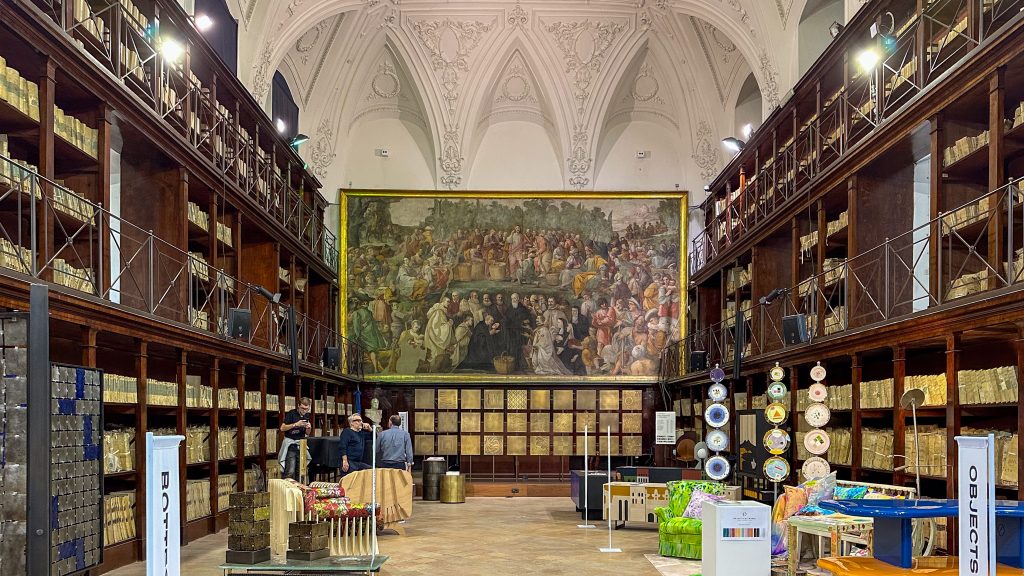Made by hand—or machine—these pure forms impresses us this year
Craft and Industrial Processes in Dialogue at EDIT Napoli 2024
Made by hand—or machine—these pure forms impresses us this year

The value we place on the handmade has led, in recent years, to a fascination with design that features imperfect forms, where evidence of the hands of makers are often more appreciated than the extreme precision derived from the use of machines. However, our observations at EDIT Napoli this year revealed a shift toward pure, bold geometry, characterized by simpler shapes, flat surfaces and often vibrant, playful colors.

The Neapolitan fair—dedicated to authorial design—has, since its inception, been able to capture emerging trends in the sector, and this year is no exception. In the magnificent halls of the Naples State Archive, amidst established companies and emerging designers, we discovered a diverse array of projects—using aluminum, ceramics, porcelain, plastics, and techniques that range from digital printing to additive manufacturing. Handmade items were still present, and part of the fun of the fair was determining whether an item was born from the hand or the machine.

Arianna De Luca and Artetica
Roman designer Arianna De Luca unveiled Carosello Artigiano, produced by Eleit. This whimsical collection of bowls and containers is meant for savoring gelato, and was designed in collaboration with master gelato makers. Alongside this pastel-colored series, her delightful ceramic candle holders and mirrors framed in vivid hues captured our attention.

From Milan, Giorgia Conte and Sergio Di Pilato of Artetica brought a touch of surprise with their U collection, an intriguing series of handmade objects with digital-inspired forms. The ends, punctuated by two large holes, can be customized with incense holders, ashtrays or small vases for plants or flowers, making each piece a playful and functional design. In both collections, vibrant color and sinuous curves take the spotlight, adding a joyful twist to the world of ceramics.

Tamborrino and Marco Ripa
Metal also took the stage at EDIT. Officine Tamborrino, a family business from Puglia, has been crafting steel furniture for three generations. For EDIT, they presented a curved version of Dedalo, a modular bookshelf designed by Alessandro Guerriero and Licio Tamburrino. The vibrant yellow color and the choice to adorn the surfaces with a collection of medicinal plants created a perfect dialogue with the frescoes and botanical collection in the historic hall.

Marco Ripa, on the other hand, embraced aluminum for the India collection, designed by Atelier Ferraro and entirely produced in the Marche region. Large tables with rounded edges and curved legs, ideal for both indoor and outdoor spaces, were paired with chairs where every weld was handmade and seamlessly invisible, resulting in pieces of absolute purity. To top it off, the India series is 100% recyclable.

MOT and M’Ama Edizioni
MOT stands for Memories of Today, a thoughtfully curated collection by Stormo Studio that brings memory-filled items to life. Defined by stainless steel, clean lines, bold colors and a variety of finishes, this collection of candle holders and vases transforms the way we display candles and flowers, offering unexpected and creative domestic landscapes.

Stainless steel and geometric shapes are also the centerpiece of Ballerina, an outdoor kitchen designed and crafted by M’ama Edizioni. Like a dancer, this perfectly round, freestanding element turns around it its center and is draped in vibrant, skirt-like fabrics that add both color and character.

Bluecycle and Mediterranea
3D-printed objects were featured at EDIT as well. Greek company Bluecycle transforms discarded fishing nets, once a threat to marine life, into playful furniture. These recycled materials are given a new life, becoming colorful tables, bookshelves and chairs. The innovative use of color creates dynamic gradients, formed by hand in real time as the machines layer the plastic, making each piece truly unique.

Mediterranea Design presented SuperEasy, a collection of 20 vases and containers crafted from PLA, a biodegradable plastic sourced from renewable and sustainable materials. These pieces stand out with their bold colors and playful, minimalist geometries.

Trama Studio and Marco Zelli
There are many ways to illuminate our living spaces, and Trama Studio offers a unique approach with Kandela, a collection of architectural beeswax candles. Designers Manuela and Francesca Pucciarini drew inspiration from Renaissance arches and columns, flipping these classical forms upside down to create vibrant, all-natural candles.

Meanwhile, Marco Zelli’s lamps resemble sculptures more than traditional lighting. Inspired by the minimalist works of Donald Judd, these pieces feature shiny surfaces painted in cyan, magenta and green. The design cleverly conceals the lightbulb, casting a soft glow that transforms the surrounding space.

Spaziointerno and Atelier Nuanda
A “stipo” is a small cabinet, traditionally crafted from fine wood and adorned with intricate decorations, used for storing precious objects, papers and documents. This piece was popular until the 19th century. Parthenope, a new interpretation by Spaziointerno, reimagines this almost forgotten marvel. The cabinet’s wooden doors showcase a classic view of Naples, brought to life through an ancient inlay technique.

Atelier Nuanda interprets another classic piece: the folding screen. Their twist features repeating aluminum modules, artfully connected by a sophisticated leather weave, handcrafted from reclaimed leather.

De Marchi Verona and ISADxForma&Cemento
Design also allows us to play with geometric forms through surfaces. De Marchi Verona has introduced Numen, a new collection of indoor and outdoor porcelain tiles, designed by Doriana and Massimiliano Fuksas. It’s porcelain, not ceramic, and as such a material is incredibly durable, enabling decoration with a level of refinement and depth of color that other materials simply cannot achieve. The result is truly spectacular.

As for other unusual surfaces, Forma&Cemento collaborated with the Mexican school ISAD to create “Una gota en la Arena,” a collection of concrete sinks. The surfaces were crafted by reinterpreting classic elements of Mexican imagery, developed during a workshop held in the Chihuahua Desert and led by designer Alessandro Gorla, held in the Chihuahua Desert.